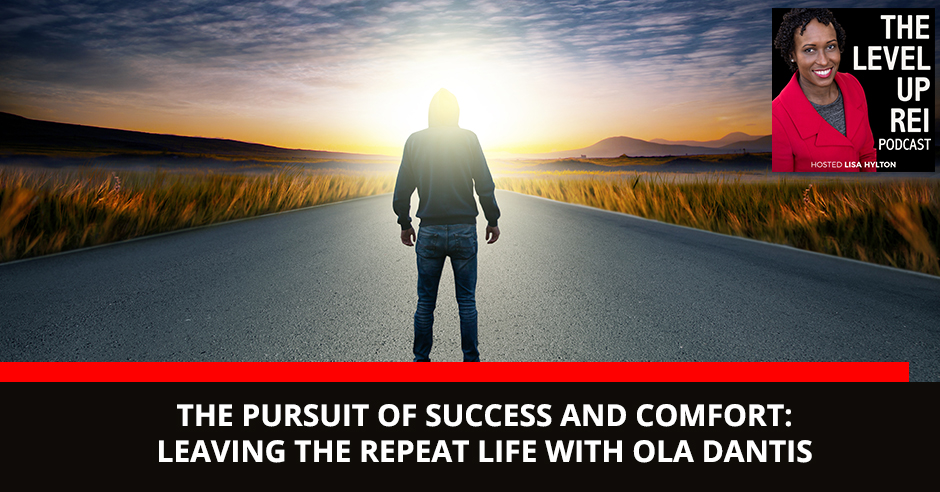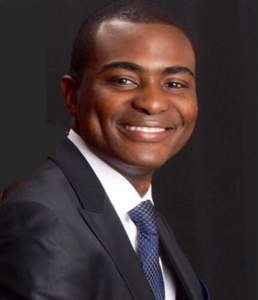
There’s always something else for you, especially when you feel stuck. In this episode, Ola Dantis, Founder and CEO of Dwellyn, joins Lisa Hylton as they talk about leaving the repeat life to pursue success and comfort. Get to know Ola and how he got started in real estate as they talk about his journey coming from the UK to the US. Lisa and Ola dive into the importance of getting uncomfortable when you have a dream, and Ola shares some of his strategies in acquiring multifamily properties. Tune in and get the courage to take the uncomfortable steps and start pursuing your dream.
—
Watch the episode here
Listen to the podcast here
The Pursuit of Success and Comfort: Leaving the Repeat Life with Ola Dantis
I’m excited to bring another amazing guest to the show. We have Ola Dantis. He is the Founder and CEO of Dwellynn.com, a multifamily investment syndication firm. He has successfully sourced deals of over $40 million by working closely with sellers and with other apartment syndicators across the country. Though Ola has only lived in the US for a few years, he has successfully completed rehab projects in excess of $1 million. He continues to exceed investors’ returns and building on his success in the real estate investing space. He likes to post his progress and encourages his community of more than 45,000 strong on Instagram. Ola, thank you for coming on the show.
Thank you so much, Lisa. I appreciate you for having me on the show. I cannot wait to jump in here with you.
I met Ola at a conference that was held in 2020. It was one of the last conferences being held at The Best Ever. It was Joe Fairless’ Best Ever Conference. It was awesome and I met Ola there. I learned more about his story and I wanted to bring him on to the show to share his journey of getting into multifamily real estate. To get started, how did you start investing in real estate?
When you bring people on the show and you say, “This person has done X million,” I feel like sometimes the readers might not be able to connect like, “How do you get from zero to millions?” I like to narrate that story. I came to the US for some years now. My wife got a job and shortly thereafter, I got a job. We’re living in a pretty and amazing luxury apartment in suburbia Maryland, a place called Columbia, Maryland. Life was great. We go to work, come home, and do it again. We’re like, “This is amazing but there’s got to be something else.” There’s that burning itch. “There’s got to be something else,” is what I was saying to myself, but I didn’t know what to do.
I also grew up in the UK, in London. A friend of mine called me from London and said, “Ola, can you meet me in Dubai and help me with my business? We can have a mastermind.” I did whatever a wise man should do. I prayed about it. I asked my wife, “My friend said I should meet him in Dubai and have this mastermind for three days.” My wife was like, “Why don’t you try Zoom, Skype or FaceTime? Why do you have to go all the way there?” I was like, “If I do go on this trip, maybe I can learn something that would help our family.” Long story short, I was on a plane to Dubai. I met my friend. We were driving quads in the desert. We were in a standard hotel in Dubai. We were masterminding for three days straight. I’m having that experience with my friend. Even though I didn’t know anything about real estate, I helped him with consulting because that’s what my Master’s degree was. I helped him repackage and reposition his business. On my way back to the US, on the plane, I was like, “I could do this real estate investing thing in the US, even though my friend is doing this in the UK.” I wanted to go back quickly to America.
The reason I mention this story is not to be long-winded. It’s to make sure that people understand that success might not come in a golden box with a red ribbon around it. It’s not going to come packaged with big horns announcing, “This is your success call,” or “This is your success moment.” As a human being and as we’re going through life, let’s pay attention. I could have got that phone call from my friend and go, “I don’t want to meet you in Dubai. Go away.” I would continue living going to work, come back, and repeat life, but I was open. For you, it could be a conference or it could be an REIA meeting that you need to go through. It could be opening up about the fact that you want to do something else with your spouse. Maybe that can lead you to a friend that does real estate that you have seen on Instagram. I don’t know but just be open.

Leaving The Repeat Life: Success might not come in a golden box with a red ribbon around it.
I went back and I didn’t know anything about real estate. My best friend, Google, did. I Googled a ton and asking basic questions like, “What is real estate investing?” A website kept coming up, BiggerPockets. I was like, “What’s this BiggerPockets thing?” If you don’t know what BiggerPockets is, go check it out. Google BiggerPockets, it’s ubiquitous in the real estate investing landscape. I went to BiggerPockets and went to the podcast. I was listening to the podcast and this book kept coming up, Rich Dad Poor Dad. I was like, “I don’t know this guy.” All the guests keep saying, “Rich Dad Poor Dad.” This was a few weeks after I got back from this trip. Talk about taking action, I was not only taking action, but I was also going at supersonic speed. That is important too. I picked up the book. I’m reading his book and I was like, “This guy that wrote this book years ago stole my idea. Everything this guy said in this book is what I’ve been trying to say.” This guy is a living legend, Robert Kiyosaki. I loved everything he said. That was the eureka moment for me.
Shortly thereafter, we bought our first building, which was a duplex in class A area in Baltimore, Maryland. That changed everything for us. Don’t forget, I was living in this luxury apartment where I never had to worry about where do I park my car. I didn’t have to worry about what property tax meant. I didn’t have to worry about who takes out the trash or what day. I’m moving to this building that I bought with my wife where we could never find parking because it’s in the city. I now have to know what property taxes are. I have to deal with the city. I have to take out the trash on certain days. Talk about adulting. I’m bringing out this almost minutia details to say you’ve got to be ready to make the sacrifices. You have to be ready to be uncomfortable. Success isn’t going to be, “Kumbaya, everything is great.” You have to know that.
We bought the building. We had tenants in the building. My wife and I were having this typical stuff at night, doing what lovers do after work, which is cooking. I look at my app and my bank account keeps growing every time. It’s like, “What did I do? We just bought this place.” She’s like, “Me, too. My account keeps growing.” Now, we’ve got all this money. That was the epiphany. I’m like, “Hold on a second. We bought this unassuming property in Baltimore, Maryland and it cashflows like crazy. What if we did this 10 or 100 times more?” That was the beginning of our company, Dwellynn.
When we started Dwellynn, I got with a mentor. Joe Fairless is a great guy. I love him to death because he is humble. It’s hard to find a humble syndicator these days. I get the same value as he does. That’s why I connected with him. That’s what started our journey in Dwellynn. We have a lot of units. I moved from Baltimore to Houston before the lockdown since January 2020. I’m telling people that when you have a dream and when you want to get stuff done, you have to get uncomfortable. You have to be ready to go and move. You have to be ready to take a risk on yourself.
When you have a dream and when you want to get stuff done, you have to get uncomfortable. Share on XThere’s so much good stuff here. Let’s dive into a couple of these things here. When you bought your duplex in class A Maryland, that changed everything. It sounded to me that there’s the parking, taxes, and trash, but that was your first taste of getting that real estate income coming in.
Absolutely. We bought this duplex. We moved into the bottom floor. The two girls upstairs, the first month that they transferred into our Bank of America account, I was telling my wife, “Somebody is paying us money.” She was like, “This works.” It’s mind-blowing because I went from paying a ton of rent at the luxury apartment to now someone is paying me. That changes a lot.
The other thing that you talked about is success requires you to get a little bit uncomfortable. How do you know when you are ready to take some of these uncomfortable steps such as making the decision to move from Maryland to Houston? We didn’t talk before but I think that you’re a full-time syndicator now.
I’m transitioning.
Talking about the process of transitioning from working full-time and moving, is that uncomfortable?
Everything is uncomfortable. It’s fascinating to me. Buying a building was uncomfortable because I have to deal with my tenants that were living above me. There are some interesting dynamics there. When I forayed into flipping, that was uncomfortable. When you are feeling too comfortable and you are not happy in that state or you’re not in a state of bliss or you are constantly agitated like, “I got to be doing more,” that’s when you know it’s time to move. When something isn’t working for you and you’re super agitated, that’s when you move because you know you can be doing more with yourself. For me, I knew right away that this is the time to buy this duplex. This is the time to move to Houston and put the Dwellynn flag deep in the ground. That’s what I’m doing.
Moving on from there, you talked about flipping. After you bought your duplex, did you get into some other different strategies of investing in real estate before moving to multifamily?
I bought this duplex and it was working fine. It was great. I was like, “Let’s do more of this.” My next natural step would have been buying a fourplex. I bought a duplex and it was working great. You go buy a fourplex or maybe a ten-unit, and maybe a third unit. I met this guy who is a partner and he said, “Let’s go flip a house down the street and we’ll make $50,000.” Even though I’m making great money in this unassuming duplex, if you walk past my duplex, you wouldn’t even know it’s a beast. I’m like, “Let me go and kill time and focus on this house down the street and flip.” For me, in retrospect, I felt like I shouldn’t have done that because that took a lot from my syndication business.
What I tell people is, “There’s always a price to pay in life and there’s never a discount. You will always have to pay the full price.” For me, that full price was even though I went and did a few projects, it took away almost a whole year from my syndication career. When I got back to syndication, some of my peers were already closing other deals. That wasn’t my issue, but it was to show factually that if you go after the shiny object syndrome, you might lose. For me, I went flipping and I learned a lot about construction. I learned a lot about contractors or CON, the first three letters. That helped me a ton. I wouldn’t have done that again. I did go into flipping and then I went back home to my family syndication. That’s how I continued my journey. I’m not going back to flipping no matter how much HGTV my wife makes me watch.

Leaving The Repeat Life: Partner up and bring something to the table.
That brings us to the way you play in real estate but before I move to that, you’re still a little bit in the early part of your journey. What is the work you do and how have you balanced investing in real estate and keeping the full-time job?
I love it when people ask me that question. I’m going to put this out there, no chest-beating whatsoever. People say, “Quit your job, burn the boat or keep your job.” I say, “Keep your job.” There are studies that suggest that you have a 33% chance of turning your side hustle into a full-time gig if you keep your day job. My job is a six-figure job. It’s not a job that you can just quit, especially if you have little midgets running around in your house. I’ve got two of them now. I tell people, “Don’t rush to quit your job because this takes time and a lot of effort.” Multifamily syndication is a complex real estate strategy. It’s not like wholesaling or flipping. I’ve been doing this for years and it’s a complex business. I was lucky because my job allows me to write code and I telecommute. I didn’t have to be in the office or be in traffic. I’m surgical with my time. I make sure that I get stuff done in time blocks. Time management has helped me to do that. I’m able to juggle both. I have a job and then I’m still trying to be in the middle of the business. I like the sound of that.
We now get to how you play. We’ve touched on it in a variety of different times. Can you officially talk about the way you play in real estate?
When you say play, I think about games. There are a lot of conversations about how to be successful. Especially in the space I’m in, which is multifamily syndication, it’s understanding the game and knowing that the rules and the playing field are already set. Especially if you look like me, I know and understand that game. I’m not trying to reinvent the wheel. I’m not trying to go in with brute force. I’m understanding the game. I’m having a helicopter view looking down on the field, understanding the players, getting connected, and making sure that I get to my desired goal. One example in syndication or in multifamily investing, you can either find deals in a variety of ways or you can be best friends with the brokers. I tried both. Being best friends with the brokers, those guys and gals wake up every day to call owners and find deals. Why am I killing myself trying to do their job while I’m trying to find investors and equity? I read a book by Simon Sinek, The Infinite Game. It talks about how life is an infinity game, it doesn’t end. We just come and go. It’s understanding that a lot.
Multifamily syndication in my opinion is 20% to 30% knowledge and 70% gain and strategy. For guys that look like me, no apologies there. I remember when I started being a syndicator. I will listen to podcasts and they will say, “Go find the deal and the money would come.” I’m like, “I don’t see that. What are you talking about?” Being in the game for so long, I’m still trying to understand like, “Find a great deal and the money comes if you’re this guy.” You have to make sure that you’re doing apples to apples comparison and you’re not comparing apples to oranges. Understanding that, but then also understanding the strategy of this business helps you. How do you interact with brokers? How do you show up when you go to a building? For instance, if you’re trying to buy a building for $5 million and you go in there with your debit card if you have one, and you’re not well-dressed. You don’t know your numbers and the terminology. It’s just not going to work. If you want to buy a house down the street, nobody cares because you’re buying a $200,000 house or something. It’s a different play. When I say game, I don’t want to be ambiguous. I want to be specific so the people that are reading can follow what I’m essentially saying.
When something isn't working for you and you're agitated, that's when you move. Share on XWhen I dig deeper into that, what are maybe some of the lessons you’ve learned having been in the syndication process for years?
For me, it’s partnering up. If you’re looking to get into multifamily syndication or you’re looking to get into real estate investing in general, look for somebody in the area that you want to invest in or that you like. Find someone that you share the same values. It’s important. I can’t talk about that enough. You have to share the same values. Partner up and bring something to the table. Maybe help raise capital in the multifamily syndication space or help them with their part of the business or something. Have value and then you’ll see stuff happen for you.
What markets do you focus on?
We like Texas a lot. That’s why I dragged my wife and my two kids all the way from Baltimore all the way to Houston, Texas. I chose Houston specifically even though some people don’t like it because of the flooding and because of the oil. I’m very much aware of that. There’s a reason why we chose this. I love this market. Anything except the DFW market, we’ll definitely take a look at it.
What would you say is a superpower that you bring to the deal?
For me, I don’t want to say just to a deal. My superpower as a human being is being a great husband, my wife would attest to that, and a great dad to my girls. I’ve got two beautiful girls. I’m a Millennial and every time I go on Instagram, we all want to show the world how amazing we are with the clothes we wear or the cars we drive. Being in this generation and being bombarded with those images, for me, it’s being humble and finding ways to have value to our communities and to people that we meet. We’ve met in person. I’m sure you remembered me. I remember you. My goal is when I touch you and meet you, I want to leave a good impact when I leave you. That’s my life goal and that’s my superpower.
What is your ‘why’ behind multifamily? Why multifamily?
I don’t want to get political on your show. We know what’s going on in America. Real estate is one true wealth builder for average Americans if you’re not a Mark Zuckerberg, you can write code well, and you can build a Facebook. Real estate has low barriers to entry. It may be not much in multifamily syndication, but you can go buy a duplex and start your journey. Everybody thinks wealth is this big safe with gold bars and stacks of cash. It’s absolutely not. If I have a house right here in Houston, Texas, and I pay this house off in 30 years, and it’s paid up and I pass that on to my girls, it is wealth. When I tell people to build wealth, people think they have to have a Lamborghini. I believe that real estate is how we can transform communities and help people. That’s my why.

Rich Dad Poor Dad
At this point, as you look back at your journey investing in real estate and taking these different paths, what advice you would give for people who are interested in taking a similar path as yourself? What advice would you give to them at a high level?
You need two different kinds of hats. You need the wisdom hat on and then you need your operations hat on. When I say wisdom, it’s filtering through to mindset and understanding that by doing this thing, I’m not just not randomly waking up and saying, “I want to be a syndicator.” There’s a lot of mindset that goes into that. There are a lot of tactics that you should be aware of and some of which I’ve mentioned about understanding the game. You’ve got two paths. If you’re saying, “Maybe I’m a little bit young, I can still get into a house.”
What advice would you give to people who are out there or to investors who are interested in investing actively like the way you invest these days?
Let’s break this down quickly. You’ve got passive investors and I’m sure we’re going to get to those that are active. If you want to be an active syndicator, because the nature of syndication is very complex, my quickest way to go is to partner with somebody that is doing syndication. They’re not just selling courses. They are actually doing syndication. You need to pay someone or a mentor to get their time, to get Facetime with them or you help a syndicator somehow. When I got into the game, that’s exactly what I did. I paid thousands and thousands of dollars to a mentor because I feel like if you have some skin in the game, it shows your level of seriousness, which is what is exactly required in multifamily syndication. It’s a very complex strategy. When I say very complex, that’s compared to flipping or something like that. There are a lot of zeros as well. That means you’ve got to be a bit more methodical when it comes to that. The best thing you can do is find a partner and then coalesce with that person. Try to provide value or just peer mentors. Those are the two options.
From there, what’s your advice for people who are interested in investing passively, especially given the pandemic and the current market situation for multifamily going forward?
Interestingly, this unique situation we have, the global pandemic and then the subsequent economic blow out that we’ve seen has been pretty good in terms of multifamily space because people have to stay in their apartments. When we talk about rent collections, it differs across the country but for the most part, most syndicators are not losing sleep. Certainly in our group, we’re not losing sleep because our delinquency reports aren’t as grim as we thought they were at the beginning of this quagmire we find ourselves in. It’s been pretty good. As a passive investor, regardless if the market cycle is right, up and down, pandemic or not, it’s finding somebody you like. It sounds basic but it’s like a marriage.
There's always a price to pay in life and there's never a discount. You always have to pay the full price. Share on XAn average deal for us is between 5 to 7 years. Some people do 3 to 5, but with everything going on now before the economy rebounded, it’s a long time to be in bed proverbially on this deal with someone. It helps to like them. For me, that’s what I tell passive investors. Make sure you like the person, get to know them and get to understand their angle because if there’s a value mismatch, there could be some issues down the line. Some syndicators are out and about and in your face. Some are more humble. I like the more humble, not like chest-beating, “Look at me, I own 50,000 units. I’m an amazing human being.” I don’t like those kinds of characters. I love good people who you can relate to and very humble. I look for people like that in my relationships because it’s a lot less irritating.
That brings me to the end of my regular questions and leads me to my level-up questions. these questions I ask all my guests. The first one is what are you grateful for in your life?
I am grateful for life. I’m so grateful to have my beautiful wife. She’s amazing and awesome. My kids, my girls are equally amazing. I’m grateful for my family. To finish that thought, I’m grateful to be able to add value to my community, especially with everything that’s going on right now. I’m trying to give back to people that look like me. There’s a lot of that conversation right now. I’m not shy about that. We have more than enough white old syndicators. There’s nothing wrong with that. It’s just that it would be nice to see diversity because I truly believe diversity breeds creativity. I’m grateful for all of that.
What has attributed to your success and continuous growth?
It’s persistence. You have to be persistent. It sounds basic but I think that is a success. I was watching Bloomberg and the interviewer asked this guy who has this AI company and built it to $1 billion or something. The guy was from the old Soviet Union. They were like, “How did you become successful?” The guy was like, “We work hard. We work harder than our competitors.” I sat there like, “It’s not rocket science.” For us, we have to be persistent. We don’t take no for an answer. We keep building and we keep learning to get better. We keep adding value over and over again. We’re trying to build a company that’s going to uplift all of us. That’s why it’s not called Dantis Inc. It’s called Dwellynn because it’s a business that I hope will be here long after I’m gone.
What do you now know that you wish you knew at the beginning of your journey?

The Infinite Game
I don’t know if I’ll change anything naturally, meaning starting small with duplex and then working my way up. I don’t think I’ll do the flipping thing again in retrospect. One thing that I would like to know or do differently would be starting when I was sixteen. I would have signed a check or open an account or whatever. I would have been buying apartments specifically. That’s what would I have been doing when I was sixteen. I wish I knew that, but here we are years later.
It was awesome to have you on the show. We had so much good information. Having a conversation with other black people who are also in this space, and who are doing amazing things and showing that it’s possible to create this and to provide opportunities to other people. If you don’t have these relationships with these people, then you don’t get the opportunity to invest. It’s an awesome job that you’re doing out here. If my audience want to learn more about you, your offerings, your business, where do they go to learn more?
I’m pretty ubiquitous on the internet. It’s Ola Dantis, you can’t miss it. Depending on where you’d like to be, I’ll be there. If you like Instagram, I’m @OlaDantis. You can’t miss me. The site is InvestWithOla.com. Check that out. If you reach out on Instagram or LinkedIn or whatever, that would be nice. I love to hear from people, so feel free to reach out.
Thank you again for coming on the show, Ola.
Thank you so much.
Important Links:
- Dwellynn.com
- Instagram – Ola Dantis
- BiggerPockets
- Rich Dad Poor Dad
- The Infinite Game
- InvestWithOla.com
- LinkedIn – Dwellynn
About Ola Dantis
 Ola, the Founder/CEO at Dwellynn.com, am multi-family investment syndication firm, has successfully sourced deals of over 40 million dollars by working closely with Sellers and with other A part ent Syndicators across the country. Though Ola has only lived in the US for a few years, he has completed rehab projects over 1M dollars. Ola continues to exceed investor’s returns, building upon his success on the real estate investing space. Ola likes to post his progress and encourages his com m unity of more than 45,000 strong on Instagram.
Ola, the Founder/CEO at Dwellynn.com, am multi-family investment syndication firm, has successfully sourced deals of over 40 million dollars by working closely with Sellers and with other A part ent Syndicators across the country. Though Ola has only lived in the US for a few years, he has completed rehab projects over 1M dollars. Ola continues to exceed investor’s returns, building upon his success on the real estate investing space. Ola likes to post his progress and encourages his com m unity of more than 45,000 strong on Instagram.
Recently, Ola, via Dwellynn’s, closed on a 160-unit apartment building in Houston, TX, and another 104-unit also in Texas. Ola continues to meet or exceed investors’ returns by investing in Value add deals in strong metropolitan cities across the United States.
Ola enjoys working with new investors both here and abroad to help them become successful real estate investors.
Finally, our firm aims to give back with Dwellynn’s 1HousePledge, which is an initiative to donate a house to a family for Christmas, starting in Baltimore. Besides, in his recent trip to the Philippines and Bali, Ola visited slums and is now working on a local initiative to help people in need.
Love the show? Subscribe, rate, review, and share!
Join The Level Up REI Podcast Community today:

Recent Comments